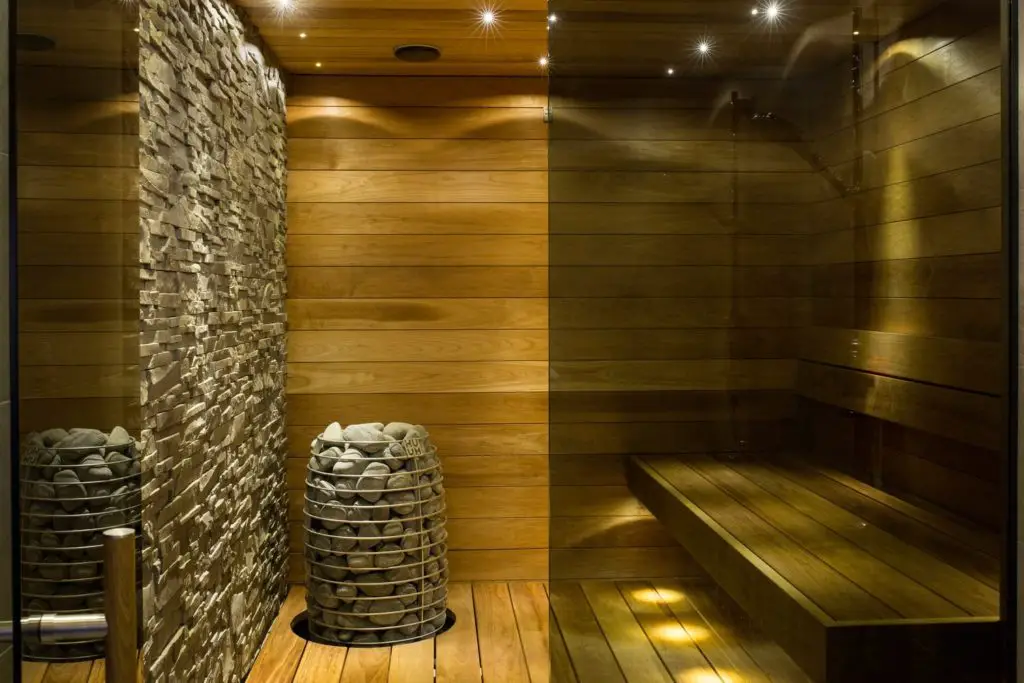Many people love using the sauna for its many benefits. Saunas offer the benefits of a relaxing, calming activity that can also provide users with something akin to a cardiovascular workout.
At the same time, however, many newbies don’t really know how to operate a sauna, other than by simply being inside.
This article will answer the question ‘does adding water to a sauna make it hotter?’, and provide some information related to this topic. It’ll also discuss some of the products that are relevant to this issue.
Many people who use saunas simply assume that adding water will make it hotter without actually considering whether this is the case!
After reading this overview, anyone who enjoys entering a sauna should know how to properly use sauna water.
Does Adding Water To A Sauna Make It Hotter? The Short Answer
The short answer to the question ‘does adding water to a sauna make it hotter?’ is no, although things are not so simple. Pouring water on the hot stones or charcoal in a traditional sauna will decrease the temperature of the air in the sauna!
On the other hand, adding water to hot sauna stones will create more steam, which can often make the sauna feel warmer.
In this way, the air inside a sauna will effectively be warmer right after the water has been added to the rocks.
That is, users of saunas should operate as if adding more water will increase the temperature since that is how the body will react.
It is important to remember that increasing humidity will limit the body’s ability to cool off.
So for all intents and purposes, doing so will feel like an increase in sauna temperature, while actually decreasing the temperature.
Weird, huh?!
Does Adding Water To A Sauna Make It Hotter? The Explanation
The reason why more steam makes it feel hotter in a sauna is that increased humidity inhibits the body’s ability to cool off.
So while the effect of pouring water on the hot elements in a sauna technically cools the space off, the body might react as if it has actually gotten hotter.
This is because sweat doesn’t evaporate as easily in very humid environments.
Creating more steam will increase the rate of heat transfer from the sauna rocks to the air, and from the air to users’ skin. It is thus not important to add too much water at a time since otherwise, people might get steam burns. Too much humidity is possible, even in a sauna.
When adding more water to the rocks in a sauna, users should expect to feel warmer for some time while the steam is dissipating into the air surrounding the rocks.
At the same time, the typical effects of a sauna environment, such as slowed breathing, increased blood flow, drowsiness, and relaxation might increase.
Infrared Saunas
Infrared saunas operate in a different manner than a traditional sauna and use a different kind of heat. These saunas typically do not feature sauna rocks, nor do they feature the humidity changes of a traditional sauna.
These saunas operate at a significantly lower heat than a traditional sauna, but the experience is often of a similar level of heat.
Conclusion
Hopefully after reading this article, any sauna enjoyer will be able to operate a traditional sauna with a good understanding of what will happen when they add more water.
They should know that although adding more water decreases the actual temperature of a sauna, it will likely still make occupants feel warmer.
This is because the body has more difficulty cooling down in higher humidity environments. It will be unable to produce more sweat above a given humidity level.
So anyone using a sauna should have a good idea of how much steam their stones give off when water is poured on them. A good sauna is not too humid nor too dry, and good rocks should release steam relatively slowly.
But ultimately, adding water to a sauna does not actually make it hotter, but it does effectively increase the temperature since the body responds as such.






